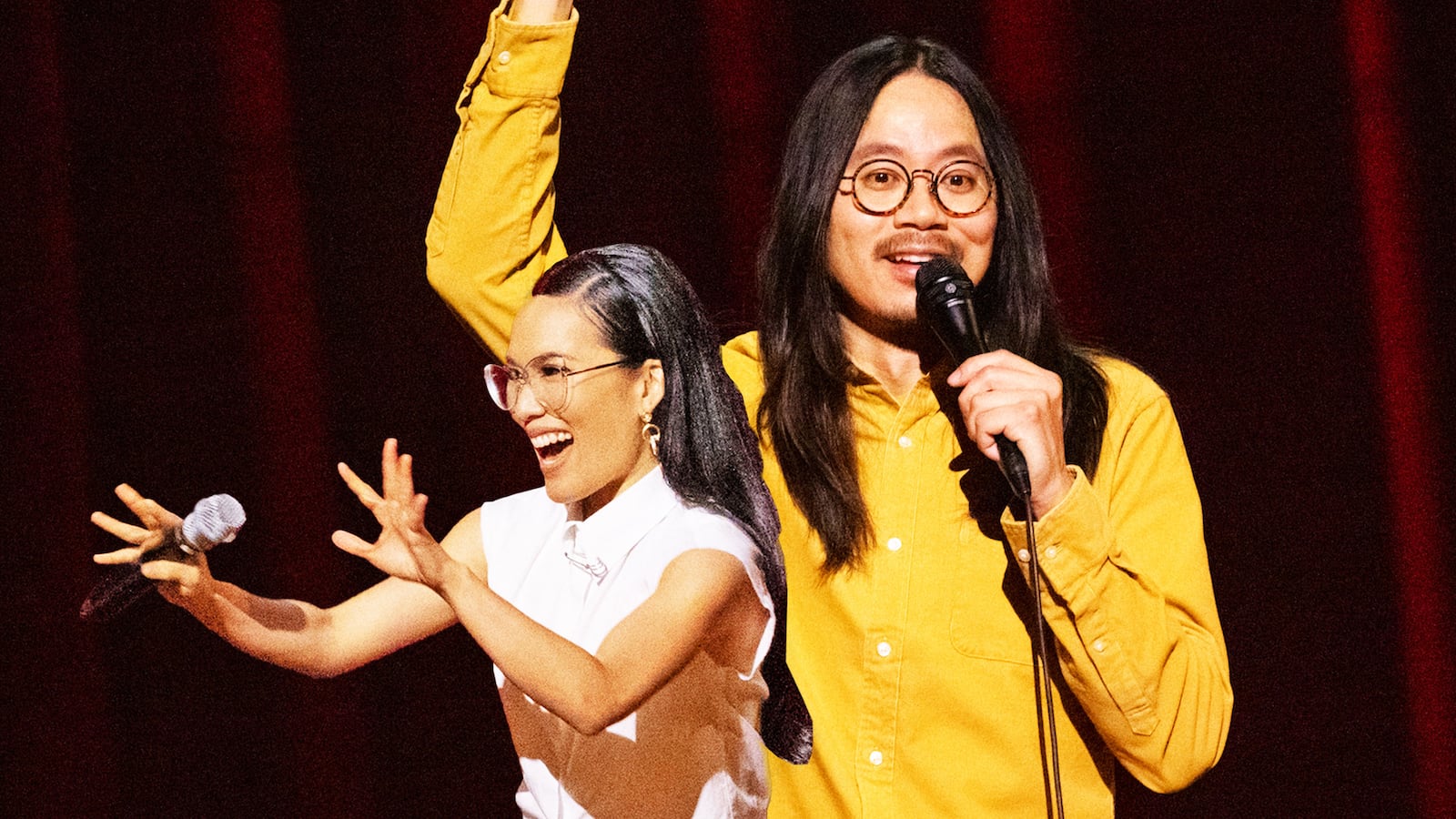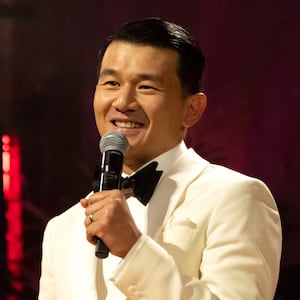Comedian Sheng Wang has spent much of his comedy career trying to hide in plain sight. Now, thanks to a boost from his longtime friend and colleague Ali Wong, he is reluctantly stepping into the spotlight.
In this episode of The Last Laugh podcast, Wang opens up about putting together his first hour-long stand-up special Sweet and Juicy, which premiered on Netflix earlier this month and also marks Wong’s directorial debut. He breaks down how seeing the late, great Mitch Hedberg perform forever changed the way he thought about comedy, and tells stories about getting judged by Norm Macdonald on Last Comic Standing, channeling his own childhood as a writer on Fresh Off the Boat, and more.
“It’s been a long journey,” Wang says of everything it took to get from his debut half-hour special on Comedy Central more than a decade ago to his first hour on Netflix this month. “It feels kind of like a dream come true, I guess, as crazy as that sounds or as cheesy as that sounds.”
Sweet and Juicy opens with an introduction from its director, Ali Wong, who calls Wang “one of my best friends and one of my favorite comedians in the entire world.” The pair came up together in the San Francisco comedy scene and Wang is godfather to Wong’s two children.
Speaking backstage after the special’s taping, Wong said, “It was really, really magical to watch this guy that I’ve believed in and known to be such an incredible and unique and different voice, and such a skilled and hard-working stand-up comedian, and such a good human being, just kill it tonight.”
“She’s been super supportive,” Wang adds in our conversation. “And to see her go from her first Netflix special to where she is now, it definitely helps to see a friend and a person of color, and another Asian face do it. It made me think that it was possible. I was always pretty confident in my material and had some idea of what I was trying to do, but to see someone like her do it, it definitely gave me inspiration and encouragement to pursue it.”
Wang’s parents immigrated to Houston, Texas, from Taiwan in the early ’80s when he was a toddler. His family of five all slept together in one bedroom in their first years in the country.
“It wasn’t weird to us,” he says now. “We didn’t know any better.” It wasn’t until middle school that he started to realize “how different it is to be not white” in America.
For the most part, Wang has kept issues of identity out of his comedy, preferring to uncover humor in everyday observations about things like having too many ripe avocados or terrible posture to which anyone can relate.
“It’s not really a conscious decision to avoid it,” he says. “I think I’m just still trying to process what that really means to be a child of immigrants. I think when I have more to say I’ll get around to it, but it’s just a matter of figuring out what it is I want to say and how I want to say it.”
Unlike many other stand-up comics, comedy was not a “childhood dream” for Wang. He wasn’t the class clown. “I was never someone that people said I should be a comedian or I was funny or anything like that,” he explains. “I don’t think that anyone suspected this would happen. I didn’t suspect it would happen.”
When he tried stand-up for the first time in college, he says he was “basically doing an impersonation” of Chris Rock because that was one of the only comedians he’d ever seen on TV. Everything changed when he saw Mitch Hedberg for the first time.
“It changed my whole idea of what stand-up could be,” he says. “Because it suddenly felt like I could maybe do that, I could maybe just share those thoughts that I have.”
Like Hedberg, Wang is known for his mind-expanding one-liners and generally laid-back delivery. “I think that’s just kind of my vibe,” he adds. “I’m just a pretty low-key person. So that was just how it always was from the beginning. I’m not a fast talker. I was not quick with comebacks or anything like that.”
He would replay social interactions in his head over and over again, wondering how he could have handled them better. “Comedy is sort of the perfect medium for that type of person, because you can figure out the best comeback, and then share it a year later,” he says, delivering what could be a dry one-liner from his act.
For anyone who is familiar with Wang from his half-hour on Comedy Central, 2 Dope Queens set on HBO or any of the other TV appearances he’s made over the past several years, his new look, complete with long, flowing hair that descends well past his shoulders, might come as a bit of a surprise.
“This is totally a pandemic accident,” he says, explaining that he had a haircut scheduled for March 11, 2020, canceled it at the last minute, and has barely trimmed it since. “I wasn’t planning on keeping it. I just wanted to see how it would look. But then people kept saying nice things and slowly it just felt like it did look like me now.” He thought about cutting it before the special taping, but it was Wong who really encouraged him to keep it.
“My whole career before this, I was trying to be as mundane and boring, as far as my physical appearance, to be as bland as possible,” he tells me. “The idea was to not be distracting. That’s the mindset that I had, was to just go on stage and let the jokes speak for themselves and not have things that people can think about or judge me on.”
Ali Wong has boldly predicted that, like her, Wang will be one of the “very few stand-up comics” to “blow up” after people get to see his special. “I think it’s a very rare and unique thing to have people discover you through your first hour stand-up comedy special,” she said, “and I know this is going to be one of those moments.”
But after watching how Netflix transformed Wong’s career, Wang is looking more warily to the future. “I’m not thinking too far ahead,” he says. “Right now, I feel like my goal is to figure out another hour, just keep doing comedy and keep writing new jokes. I’m trying to not give myself too much pressure, although I’m getting comments from people like, ‘Can’t wait to see more!’ So I’m trying to not let that get to me.”
“Ali did a lot,” he adds. “She wrote a book, she made a movie, she did two more specials. I don’t know if I could hang like that.”
When I ask if he would even want her level of fame were it to come his way, Wang says he’s already “weirded out” by getting recognized one time at a restaurant by someone who had seen his new special the night before.
“I’ve been on tour with Ali and I’ve seen just how hard it is to eat lunch in public sometimes or have your kids around,” he adds. “And it’s part of being in this business, but I don’t really want that level of fame. But I don’t know how much say I have in that anymore. It feels like it’s just going to be what it is, but that’s just kind of the trade-off. I’d rather live more anonymously. Unless I’m on stage doing a set, I’m not really looking for the spotlight.”
Listen to the episode now and subscribe to ‘The Last Laugh’ on Apple Podcasts, Spotify, Google, Stitcher, Amazon Music, or wherever you get your podcasts, and be the first to hear new episodes when they are released every Tuesday.


